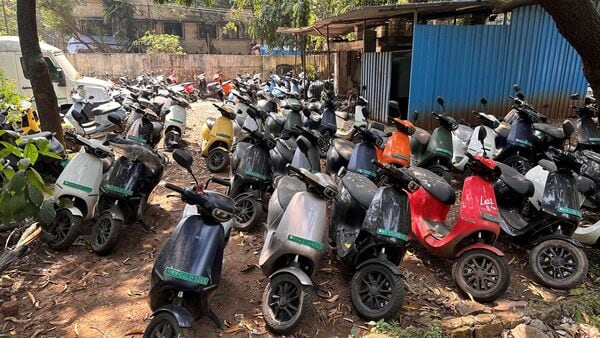Electric vehicles: Future of Indian 2Wheeler industry? Check what experts think
- The Ministry of Road Transport and Highways (MoRTH) data reveals that the market share of electric two-wheelers has escalated from a mere 0.3 per cent of all two-wheelers sold in FY21(financial year) to 5.4 per cent in FY24.
–>
The Ministry of Road Transport and Highways (MoRTH) data reveals that the market share of electric two-wheelers has escalated from a mere 0.3 per cent
…

In the bustling streets of India, where the hum of motorised vehicles is a constant melody, a silent revolution is underway. Electric two-wheelers (E2Ws) are gradually but decisively carving their niche in the country’s transportation landscape. From bustling metropolises to remote villages, the allure of clean, efficient, and cost-effective mobility solutions is captivating an increasingly diverse array of consumers.
As data from the Ministry of Road Transport and Highways (MoRTH) reveals, what began as a mere blip on the radar in FY 2020-21(financial year), with electric two-wheelers comprising a modest 0.3 per cent of all two-wheelers sold, has burgeoned into a notable 5.4 per cent share by FY 2023-24. This exponential growth trajectory underscores the growing acceptance and adoption of electric two-wheelers among Indian consumers, driven by factors such as environmental consciousness, cost-effectiveness, and technological innovation.
A recent report titled ‘Surging ahead: How electric two-wheelers are rapidly gaining popularity with the diverse Indian consumer,’ published by the Boston Consulting Group (BCG), provides insights into the evolving dynamics of the E2W market in India. The report identifies ten distinct “demand spaces,” each characterised by specific consumer needs and usage patterns, highlighting the nuanced nature of consumer preferences in the electric mobility landscape.
Unlike traditional demographic-based segmentation, these demand spaces are delineated based on factors such as travel distance, purpose, and lifestyle choices, reflecting a holistic understanding of consumer behaviour.
Key findings
One of the key findings of the BCG report is the increasing influence of functional and emotive factors in shaping consumer preferences towards electric two-wheelers. While some consumers prioritise practical considerations such as affordability and ease of maintenance, others are drawn to the eco-friendly appeal and futuristic allure of electric mobility. This diversification of consumer needs underscores the importance of offering a diverse range of E2W options tailored to cater to varying preferences and lifestyles.
Moreover, the report highlights the evolving consumer mindset towards electric mobility, with one in three potential two-wheeler buyers actively considering electric options. This growing awareness and acceptance of electric vehicles (EVs) among Indian consumers signify a significant shift towards sustainable transportation solutions, laying the groundwork for accelerated adoption and market growth in the years to come.

To capitalise on this burgeoning market opportunity, stakeholders in the E2W ecosystem must adopt a multi-faceted approach encompassing product innovation, infrastructure development, and consumer education. OEMs (Original Equipment Manufacturers) need to prioritise target value pools and tailor their product offerings to align with diverse consumer demand spaces identified in the BCG report. Moreover, investing in innovative go-to-market strategies, such as seamless customer experiences, competitive pricing, and robust charging infrastructure, is crucial for driving widespread adoption and market penetration.
In addition to product-centric initiatives, fostering collaboration across the ecosystem, including government bodies, industry players, and technology providers, is essential for overcoming barriers to adoption and accelerating the transition towards electric mobility. By leveraging synergies and pooling resources, stakeholders can address key challenges such as range anxiety, charging infrastructure gaps, and consumer awareness, thereby fostering a conducive environment for E2W proliferation.
Also Read : Amitabh Kant calls for Indian electric two-wheeler companies to go global
Furthermore, investing in organisational capabilities, including talent development, R&D (Research and Development), and strategic partnerships, will be instrumental in building sustainable competitive advantage in the rapidly evolving E2W landscape. As the electric mobility market continues to evolve, agile and adaptive strategies will be essential for staying ahead of the curve and capturing a significant share of the burgeoning market opportunity.
Electric two-wheelers are poised to revolutionise the transportation sector in India, offering a compelling blend of environmental sustainability, economic viability, and technological innovation. With concerted efforts from stakeholders across the value chain, electric two-wheelers have the potential to not only transform urban mobility but also empower millions of Indians with clean, accessible, and affordable transportation solutions.
First Published Date: 07 May 2024, 10:53 AM IST

